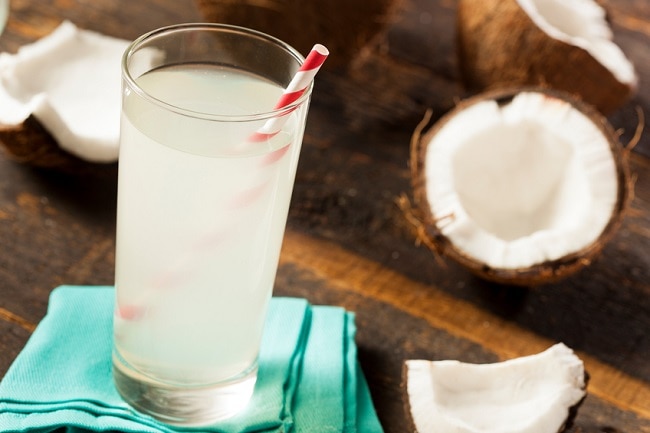People with fitness goals pay close attention to what goes in their bodies. You know the foods you choose to fuel your machine directly impact energy levels, strength and stamina. So when the coconut oil craze came about, it was a quick-and-easy addition to your nutrition plan. The talk of MCTs and “direct energy” were like a dream body come true. It’s also delicious, filling and can be added to endless coconut-oil recipes – smoothies, salad dressings, stir-frys and so much more! But is this tropical-inspired trend worth your attention?
There are countless blogs and articles that credit coconut oil for every health benefit under the Caribbean sun. You’ve probably heard coconut oil helps with weight loss, cholesterol and even cancer. Unfortunately, the research is still out on a number of coconut oil’s acclaimed benefits. For athletes, though, there may be some positive performance results from consuming coconut oil. Let’s look at those in more detail.
Rumor has it: Coconut oil can improve body composition.
Science says: You’ve heard for years the benefits of eating a Mediterranean-style diet, because it provides an adequate serving of healthy fats from omega-rich fish and Italy’s favorite condiment – olive oil. Interestingly enough, a 2008 study in The American Journal of Clinical Nutrition compares MCT consumption to that of olive oil. The study showed there was a slight skew toward greater total fat loss, as well as loss of fat mass in the abdominal region, when participants consumed MCT oil compared to those who ate olive oil. The study included 48 overweight men and women ages 19-50, who consumed either MCT oil or olive oil as part of a 16-week weight-loss program.
Though olive oil provides healthy fats, they may not be the best kinds of fats. Olive oil, like most vegetable or seed oils, is mostly composed of long-chain fatty acids, which could be the reason for the difference in weight management benefits. “MCTs are hydrolyzed more rapidly and metabolized more completely than long chain fatty acids (LCFAs) and are less likely to be deposited as fat than LCFAs,” says Samuel Kramer, MS, RD, CISSN and R&D Nutritionist for Vitacost.com.
Rumor has it: Coconut oil can increase energy.
Science says: “Coconut oil is a naturally great source of MCTs, which are quickly absorbed by the body and used for energy,” says Kramer. Physiologically speaking, the MCTs in coconut oil beat out LCFAs when it comes to nutrient absorption. That being said, does this translate to improved endurance performance? In a small study of 9 trained cyclists, the answer was no. The cyclists consumed a 400mL mix of either a 10% carbohydrate solution, 10% carb + 1.72% MCT oil or a 10% carb + 3.44% MCT solution at the start of exercise and then an additional 100mL every 10 minutes after. The International Journal of Sport Nutrition concluded there was no marked difference between the carb-only consumers and the MCT groups. On the plus side, there were no gastrointestinal symptoms reported, either.
In another study from the Journal of Sports Medicine & Physical Fitness, 12 male endurance runners consumed either 56 g of corn oil (long-chain fatty triglycerides) or 60 g of MCT oil daily for two weeks. Participants then performed a max-effort treadmill test followed by an endurance treadmill test, where they had to run at 85% VO2max for 30 minutes plus 75% VO2max until exhaustion. Performance was measured by length of run in minutes before exhaustion. In the end, there was no difference between VO2max and performance between the two groups. There was a higher respiratory exchange ratio (RER = amount of carbon dioxide produced compared to amount of oxygen used) at 15 minutes for the MCT oil group, but no other time points showed significant differences.
In short bursts of activity, the MCTs in coconut oil may help moderate oxygen consumption. However, as your workout continues, MCT consumption does not significantly alter performance in trained athletes.
Rumor has it: Coconut oil can contribute to weight loss.
Science says: One school of thought is that coconut oil acts as a thermogenic, which raises body temperature. The theory is that through improved thermogenesis there may be weight-loss effects. This theory goes back a couple decades to a 1989 study by the Department of Pediatrics at Vanderbilt University. Ten males, ages 22-44, were overfed (150% of estimated caloric needs) using a liquid formula diet that consisted of 40% of either MCT or LCT oil. The thermic response to food (TEF) for the MCT group increased on day 1. Five days later, TEF was still unchanged in the LCT group. This indicates that a diet rich in MCT “stimulates thermogenesis to a greater degree than does excess energy as LCT.”
Bottom line
If you’re worried about overall health: Often dubbed “unhealthy fats,” saturated fats like MCTs can increase the risk of high blood pressure, insulin resistance and other metabolic conditions. So even though MCT consumption may be beneficial to weight management, there was some concern it would lead to other health problems. A 2008 study in Journal of the American College of Nutrition concluded that MCT consumption has no adverse effect on metabolic risk factors. The study further noted, “Distinction should be made regarding chain length when it comes to discussing the effects of saturated fats on metabolic risk factors.”
If you’re trying to reach your “race weight”: Moderate MCT consumption within your daily caloric needs may aid your weight-loss efforts.
If you’re focused purely on endurance performance: Coconut oil is not all it’s cracked up to be.

